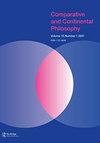Critique as Virtue: Buddhism, Foucault, and the Ethics of Critique
IF 0.3
0 PHILOSOPHY
引用次数: 0
Abstract
ABSTRACT This article examines Michel Foucault’s views concerning the ethical salience of critique and compares those views to the Buddhist Madhyamaka tradition. As a critic of the Enlightenment, Foucault’s approach to ethics vacillated between deconstructing moral concepts such as “self” and “freedom,” and affirming them as the basis of an ethics conceived as “self-fashioning.” Madhyamaka thought provides a critical account of social reality that resonates with Foucault, particularly concerning the emancipatory potential of critique, but it arrives at different ethical conclusions, viewing compassion rather than vertiginous freedom as the outcome of any thorough critique of the self.作为美德的批判:佛教、福柯与批判伦理学
摘要本文考察了米歇尔·福柯关于批判的伦理显著性的观点,并将这些观点与佛教的中央派传统进行了比较。作为启蒙运动的评论家,福柯的伦理学方法在解构“自我”和“自由”等道德概念和肯定它们作为被视为“自我塑造”的伦理学基础之间摇摆不定。中央集权思想提供了对社会现实的批判性描述,与福柯产生了共鸣,特别是关于批判的解放潜力,但它得出了不同的伦理结论,将同情而非令人眩晕的自由视为对自我彻底批判的结果。
本文章由计算机程序翻译,如有差异,请以英文原文为准。
求助全文
约1分钟内获得全文
求助全文

 求助内容:
求助内容: 应助结果提醒方式:
应助结果提醒方式:


